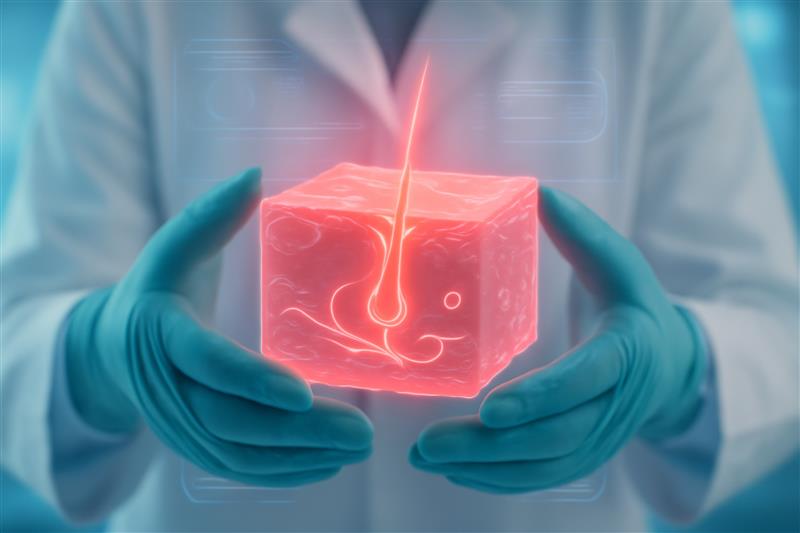How Hair Loss Specialists Can Help You Find the Right Treatment

SHOP this article
OMI
Hair Growth Peptides Capsules
Promote stronger hair growth and scalp health with our unique peptide formula.
Hair loss is complex. It has many possible causes, and there’s no one-size-fits-all solution. But the right team of experts, each with their own role in diagnosis, treatment, and support, can help you understand the root causes of hair loss and offer a clear path to healthy, vibrant hair. This guide outlines when to seek professional help, who those professionals are and what they do, what to expect from an appointment and the treatments they may offer. Consider this your primer on building the ultimate hair care support team.
The First Step: Visiting Your Primary Care Physician
Your primary care physician is the best place to begin your hair restoration journey. They can take a thorough medical history, examine your scalp, and determine whether there are any underlying health problems contributing to your hair loss.
During this appointment, your doctor will ask about when the hair loss began, how it has progressed, and whether you have noticed any other symptoms. They’ll want to know about your diet, lifestyle, medications, and any family history of hair loss. They will likely order laboratory tests to check for common triggers such as thyroid disease, iron deficiency, vitamin D or B12 deficiency, and anemia. They may also check hormone levels if you have irregular menstrual cycles, acne, or other symptoms of hormonal imbalance.
If an underlying health condition is discovered, your doctor can begin treatment right away. They may also recommend over-the-counter topical products such as minoxidil to stimulate hair growth, or medicated shampoos to support scalp health. They may also refer you to a dermatologist or another specialist for further evaluation.
The Core Specialist: A Board-Certified Dermatologist
If hair loss persists or the cause is not immediately clear, your next step should be to see a dermatologist. Dermatologists are medical doctors who specialize in conditions of the skin, hair, and nails. They are the primary specialists for diagnosing and treating hair loss.
A dermatologist will carefully examine your scalp, often using a dermatoscope to magnify the hair follicles. This helps them see early signs of hair miniaturization, inflammation, or scaling. In certain cases, they may take a small scalp biopsy to confirm the diagnosis, especially if they suspect a scarring form of hair loss that could cause permanent damage if not treated quickly.
Dermatologists can prescribe a wide range of treatments depending on your diagnosis. These may include topical or oral minoxidil to prolong the growth phase of hair, antiandrogens such as finasteride, dutasteride, or spironolactone to reduce the effects of hormones that shrink hair follicles, and anti-inflammatory shampoos like ketoconazole. They can also administer corticosteroid injections or prescribe oral immunosuppressors, such as JAK inhibitors for autoimmune-related hair loss such as alopecia areata.
Many dermatologists also offer in office procedures such as platelet-rich plasma (PRP) injections, microneedling lasers and dutasteride mesotherapy to stimulate follicle activity. Low-level laser therapy (LLLT) devices can be added to home treatment or used in the dermatologist’s office. There are also new experimental treatments such as exosome and stem cell injections that are possibly effective, but not yet approved by the FDA.
For inflammatory or scarring alopecias such as lichen planopilaris or frontal fibrosing alopecia, dermatologists use targeted medications to stop the immune system from attacking the hair follicles. Early intervention in these cases is critical.
Balancing the Body: The Endocrinologist
Hormonal imbalances are a common but sometimes overlooked cause of hair loss. An endocrinologist is a doctor who specializes in hormone-related conditions. You may be referred to one if your blood tests show abnormal hormone levels or if you have symptoms such as irregular periods, excessive facial hair, sudden weight changes.
Endocrinologists diagnose and treat conditions such as hypothyroidism, hyperthyroidism, polycystic ovary syndrome (PCOS), adrenal disorders, and insulin resistance. These conditions can disrupt the normal hair growth cycle and lead to shedding or thinning.
Treatment from an endocrinologist may involve adjusting your thyroid medication if you take that, prescribing hormone-regulating medications for PCOS, or addressing insulin resistance through lifestyle changes and medication. By correcting these imbalances, they can help stabilize your hair loss and create an environment where regrowth is possible.
Caring for the Scalp: The Trichologist
Trichologists are not medical doctors, but they are trained to focus on hair and scalp health. They are particularly helpful for improving the quality of your hair care routine and protecting fragile hair from further damage.
A trichologist can assess the condition of your scalp, examine hair fibers for breakage, and evaluate the effects of styling, coloring, or chemical treatments. They can recommend gentle cleansing products, targeted scalp treatments, and styling techniques that reduce tension on the hair follicles.
Although trichologists cannot diagnose or treat medical causes of hair loss, they work well alongside medical specialists by ensuring your hair care habits support rather than hinder your recovery.
Feeding Your Follicles: The Registered Dietitian
Your diet plays a crucial role in the health of your hair. Hair follicles are among the most metabolically active cells in your body, which means they need a consistent supply of nutrients to function properly. A registered dietitian who understands hair health can help you meet these nutritional needs.
They will review your eating habits and identify any deficiencies in protein, iron, zinc, vitamin D, biotin, and omega-3 fatty acids. They can also address issues such as anemia, crash dieting, or nutrient loss after weight loss surgery. A dietitian can design a balanced eating plan to support both your overall health and your hair growth.
For people recovering from telogen effluvium, which is often triggered by illness, stress, or major dietary changes, nutritional optimization can help the hair return to its normal growth cycle more quickly.
When Surgery is an Option: Hair Transplant Surgeons
If your hair loss is stable and medical therapy has done all it can, a hair transplant may be worth considering. Hair transplant surgeons are often dermatologists or plastic surgeons who have undergone specialized training in surgical hair restoration.
There are two main types of transplant procedures. Follicular Unit Excision (FUE) involves removing individual hair follicle units from a donor area, usually at the back or sides of the scalp, and implanting them into thinning or bald areas. This method leaves tiny dot-like scars that are barely visible. Follicular Unit Transplantation (FUT) involves removing a strip of scalp from the donor area and dissecting it into grafts. This method can produce a high number of grafts in one session, but it leaves a thin linear scar.
A skilled surgeon will evaluate your hair loss pattern, donor hair availability, and long-term goals before recommending surgery. They will also explain the importance of ongoing medical therapy to protect your remaining natural hair, since a transplant does not stop future hair loss. Many surgeons combine surgery with PRP or LLLT to improve graft survival and overall results. While hair transplantation is very effective for men with good hair density in the back of the scalp, it is often less effective in women, where the hair thinning is usually more diffuse. This is not an option in case of alopecia areata or scarring alopecia
The Emotional Side: Mental Health Professionals
Hair loss can be deeply emotional. For some people, it affects confidence so severely that it impacts their work, relationships, and social life. Stress and anxiety can also worsen certain types of shedding, creating a difficult cycle.
A mental health professional can help you cope with these feelings, develop strategies for managing stress, and work on body image concerns. For individuals with trichotillomania, which is a compulsive urge to pull out one’s hair, a therapist trained in cognitive behavioral therapy (CBT) or habit reversal training can provide targeted support.
By addressing the mental health aspect of hair loss, you not only improve your emotional well-being but also create a healthier environment for physical recovery.
Everyday Confidence: The Hair-Loss-Savvy Stylist
While medical treatments work overtime, a stylist experienced in working with thinning hair can help you look your best right now. They can suggest cuts and styles that make your hair look fuller, use strategic layers to disguise thin spots, and recommend hair color techniques that reduce the contrast between hair and scalp.
They can also guide you toward low-tension hairstyles, safe coloring processes, and the use of hairpieces, toppers, or wigs that blend naturally with your own hair. This kind of cosmetic support can make a big difference in confidence while you wait for medical treatments to show results.
Camouflaging Thinning: Scalp Micropigmentation
Scalp micropigmentation, or SMP, is a cosmetic procedure that uses tiny, tattooed dots to replicate the look of hair follicles. This can make thinning areas look denser or create the appearance of a clean, shaved head.
It is especially useful for people with diffuse thinning, those who want to conceal scars from previous surgeries, or transplant patients who want to enhance the appearance of density. SMP does not regrow hair, but it can be a powerful confidence booster. Choosing an experienced and reputable artist is essential to achieve natural results.
The Pharmacist’s Role in Hair Loss Treatment
Pharmacists often play an important supporting role in hair loss management. They can help you understand how to use your medications correctly, identify potential side effects, and watch for interactions between prescriptions.
In some cases, they can prepare compounded medications that combine treatments like minoxidil and finasteride into a single topical solution, making your regimen easier to follow. Their guidance can be invaluable in sticking to your treatment plan consistently.
Bringing Together a Hair Health Team
Hair loss is rarely solved with one professional or one treatment. The most effective approach is building a team that includes a dermatologist as the central figure, supported by your primary care physician, and supplemented by specialists such as endocrinologists, trichologists, dietitians, stylists, SMP artists, and pharmacists.
By taking a coordinated, evidence-based approach, you can address both the medical and cosmetic aspects of hair loss. This not only maximizes your chance of regrowth but also helps you maintain confidence and emotional well-being during the process.
Frequently Asked Questions
1. Which doctor should I see first if I am losing hair?
Start with your primary care physician, who can run basic tests and refer you to a dermatologist if needed.
2. Can a dermatologist really help with hair loss?
Yes, dermatologists specialize in hair and scalp conditions and can prescribe proven treatments like minoxidil, antiandrogens, PRP, or corticosteroid injections.
3. Is a hair transplant a permanent solution for thinning hair?
A hair transplant redistributes your existing hair and can be long-lasting, but ongoing medical treatments are needed to protect the rest of your hair.
References
- 1. Kaiser M, Abdin R, Gaumond SI, Issa NT, Jimenez JJ. Treatment of androgenetic alopecia: current guidance and unmet needs. Clin Cosmet Investig Dermatol. 2023;16:1387-1406. doi:10.2147/CCID.S385861.
- 2. Vañó-Galván S, Fernandez-Crehuet P, Garnacho G, et al. Clinical management of androgenetic alopecia: consensus statement by Spanish Hair Disorders Group (AEDV). Actas Dermosifiliogr. 2024;115(4):T347-T355. doi:10.1016/j.ad.2023.10.013.
- 3. Hughes ECW, Elston DM. Telogen and anagen effluvium: treatment and management. Medscape. Updated Jan 23, 2025.
- 4. Mounsey AR, Reed SW. Diagnosing and treating hair loss. Am Fam Physician. 2009;80(4):356-362.
- 5. Journal of the American Academy of Dermatology. Approach to the patient with hair loss. JAAD CME Article. 2023.
- 6. European Dermatology Forum (EDF). Evidence-based (S3) guideline for the treatment of androgenetic alopecia. J Eur Acad Dermatol Venereol. [PDF guideline].
- 7. Allure (news article). A new form of alopecia is affecting menopausal women. Allure. August 4, 2025.
- 8. Self (news article). The best hair loss treatments for women, according to dermatologists. Self. March 5, 2024.









